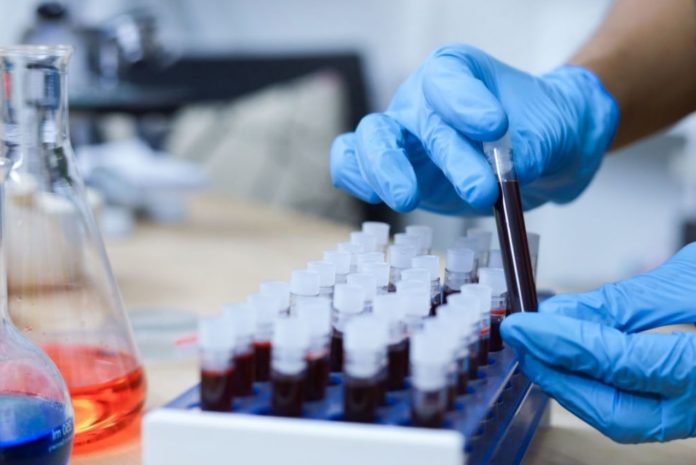A new drug, that destroys a protein that fuels acute myeloid leukaemia (AML) – a rare and particularly aggressive form, could cure one of the deadliest blood cancers has been developed by British scientists.
Scientists are hopeful that the technique could lead to treatments for other forms of cancer as well.
In experiments on humans and mice, the compound stopped the disease in its tracks. Clinical trials are expected within a year.
- Does This Mean We Stopped Being Animal and Started Being Human Due to ‘Copy Paste’ Errors?
- The One Lifestyle Choice That Could Reduce Your Heart Disease Risk By More Than 22%
- Aging: This Is What Happens Inside Your Body Right After Exercise
- Immune-Boosting Drink that Mimics Fasting to Reduce Fat – Scientists ‘Were Surprised’ By New Findings
- Gun Violence in America: What They Don’t Talk About at the Debate
It blocked the cancerous effect caused by over-expression of the enzyme, known as METTL3.
The medication inhibited its action in lab rodents with AML – and tissue cultured from actual patients.
Study leader Professor Tony Kouzarides, of Cambridge University, said:
“Proteins are essential for our bodies to function and are produced by a process that involves translating our DNA into RNA using enzymes.”
The former is the ‘blueprint’ and the latter the ‘worker’ – responsible for converting genetic information into the necessary products for life.
Prof Kouzarides said:
“Sometimes this process can go awry – with potentially devastating consequences for human health.
“Until now, no one has targeted this essential process as a way of fighting cancer. This is the beginning of a new era for cancer therapeutics.”
As described in the journal Nature – it could help treat a range of cancers.
Our genetic code is written in DNA. To generate proteins – molecules vital to the function of organisms – it first needs to be changed into RNA.
Enzymes then make the chemical alterations. But occasionally they become mis-regulated – leading to an over-abundance.
Four years ago Prof Kouzarides and colleagues traced AML to the over-production of METTL3.
It occurs when bone marrow makes abnormal white blood cells known as myeloid cells – which normally protect against infection and the spread of tissue damage.
It spreads rapidly – usually requiring immediate treatment.
In tests on cell lines from individuals with AML the molecule, called STM2457, significantly reduced their growth and proliferation.
It also triggered a process known as apoptosis or ‘cell death’ – killing off the cancerous cells.
The AML cells from patients were then transplanted into immuno-compromised mice to model the disease.
When the animals were injected with STM2457 it impaired the spread of the disease and dramatically prolonged lifespan.
It also reduced the number of leukaemic cells in the mouse bone marrow and spleen while showing no toxic side effects – including no weight loss.
Co-author Dr Konstantinos Tzelepis, also from Cambridge, said:
“This is a brand-new field of research for cancer and the first drug-like molecule of its type to be developed.
“Its success at killing leukaemia cells and prolonging the lifespans of our mice is very promising and we hope to begin clinical trials to test successor molecules in patients as early as next year.
“We also believe that this approach – of targeting these enzymes – could be used to treat a wide range of cancers, potentially offering us a new weapon in our arsenal against these terrible diseases.”
On Sunday, former Coventry City footballer Ashley Cain announced his eight-month-old daughter Azaylia had died from AML.
Cain, now a reality TV star, and partner Safiyya Vorajee had raised more than $2.0m or about £1.5m earlier this year to fund specialist treatment for Azaylia in Singapore.
But the 30-year-old told his Instagram followers last month she had become too ill for the treatment.
- Does This Mean We Stopped Being Animal and Started Being Human Due to ‘Copy Paste’ Errors?
- The One Lifestyle Choice That Could Reduce Your Heart Disease Risk By More Than 22%
- Aging: This Is What Happens Inside Your Body Right After Exercise
- Immune-Boosting Drink that Mimics Fasting to Reduce Fat – Scientists ‘Were Surprised’ By New Findings
- Gun Violence in America: What They Don’t Talk About at the Debate
Michelle Mitchell, chief executive of Cancer Research UK, said:
“This work is yet another example of how our researchers strive to get new cancer treatments into the clinic and improve outcomes for cancer patients.
“Acute myeloid leukemia is an aggressive form of cancer that grows rapidly. Treatment is required as soon as possible after diagnosis, which means research like this can’t come soon enough.
“We look forward to seeing the outcomes of the phase 1 trial and the benefits it may have for AML sufferers and their families in the future.”
Prof Kouzarides and colleagues have set up spin-out company STORM Therapeutics. It specialises in translating research into the discovery of first-in-class drugs in oncology and other diseases.
